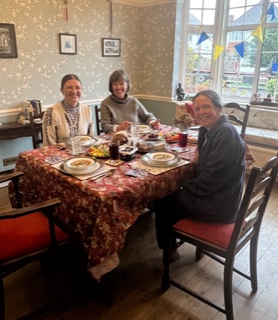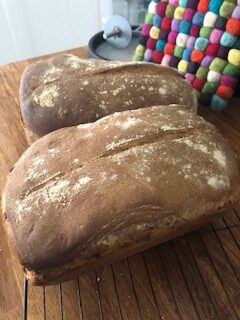Originally, this post was going to be called ‘The Happiness List’, because the activities set out below generally make me happy. However, I realised that this was not quite accurate. In truth, I keep to this schedule of activities to prevent myself from falling into the deep chasm of despair.

Living with a chronic illness is to constantly negotiate the high wire. One false step and down you tumble. There is no happy ending nor really much to hope for except more of the same and worse. It is, on the surface, not a formula for a great life.
That said, it has made me acutely aware of how I spend my time and what helps rather than hinders me. It has also made me aware of how many of us are struggling with any number of issues that are equally demoralising. So if your life is tickety-boo, you need read no further and just enjoy your good fortune.
If, however, like me, you need a bit of daily cheer: read on.
Distraction, distraction
There really is no cure for chronic pain, grief or long-standing depression. All we can do is to distract ourselves from it for as long as we can and, in doing so, diminish its hold on us.
When I am immersed in a brilliant book, the pain in my legs miraculously disappears. Our brains, it seems, are only capable of holding on to one concentrated thought at a time, so if we choose an enjoyable one, we can escape ourselves for a while and build some resilience for when we are less occupied.

The same applies to some of the other tasks on my list: to create something, to meditate and to learn a language (which has the added bonus of boosting our brains).
Dealing with it
My day begins (ideally) with my journal pages. Here is my opportunity to rant, rejoice, wallow in self-pity or note words of wisdom.
Usually, I begin by reading the entry before and sometimes I laugh at my own comments. Twenty-four hours often brings the clarity you need. Very little seems quite as dramatic or terrible after a night’s sleep.
But since this is only for me, it is an opportunity to be honest about all my feelings. Humans are amazing, but we are not always that good at listening to one another or understanding.
My journal takes it all in without comment or censure. It gives space for solutions to flow through guidance. It also relieves my friends of listening to my fretting.
Keeping social
Perhaps the greatest danger when we feel unwell or down is to distance ourselves from others. It is entirely understandable. The bed seems so alluring with its cosy duvet and plump pillows. It will not judge or demand anything of us. And the unconsciousness of sleep allows our busy minds to rest.
Of course, necessary convalescence aside, our beds should be restricted to only the hours of sleep we actually need (in my case about eleven!)
But the rest of the time, we need to engage with others. Each morning I reply to texts and enjoy the crazy cartoons. (I really should contribute more.) Later in the day, I’ll reply to emails and write cards/letters. I try to see someone at least every other day. My friends keep me sane and Mariia’s company is an extra boon.

Image: Karen Costello-McFeat
Despite a love of entertaining, I cannot always find the energy to do so. Instead, I am learning to ask others to contribute a dish or perhaps meet up at a cafe. Accepting one’s limitations does not mean giving up on precious reunions only redefining them.
Go outside (or look outside)
There is so much written about the benefits of nature that I hardly feel that I can contribute more here. I’ve just been out in the garden and wrestled with dandelions and bindweed and inhaled the fresh, intoxicating smell of earth. Though I probably managed a whole ten minutes, it was enough.
For those of you chained to a desk, the outside is hopefully still visible. While writing, I looked up to see a tiny coal tit balancing on the tippy-top of my apple tree singing noisily. All of us, I hope, have at least the view of the ever-changing panorama of sky and even a few minutes gazing heavenwards will soothe our souls and our eyes.
Do something useful
For me, the worst thing about my disability is the sense that I am useless. I can’t contribute financially, I can’t do half the housework, and I can’t do many of the things I once tackled quickly and efficiently.
No-one wants to feel that way.
So, I try to focus on what I can do and adopt Tesco’s tag-line that ‘Every little helps’.

Image: Karen Costello-McFeat
Ours is a family of foodies and I love to cook and bake. Yesterday, I made bread with the help of my sturdy mixer which does most of the kneading. My loaves are slightly wonky and perhaps a little on the dark umber side, but they taste good and will last longer than a single meal.
Perhaps we need to ask for help or indulge in equipment that will take the physical strain, but if we allow ourselves to lower our personal expectations, there is much we can achieve.
Find something to be thankful for
When reading my Flow magazine, I came across this thought:
‘Not every day will be good, but there is good in every day’
Flow
Remembering this is perhaps the key to contentment. No matter how dreadful our day, if we search, we will find at least one thing that lifted our spirits or made us smile. The discipline of looking for the good in every day tends to multiply these moments exponentially. Through keeping gratitude in our hearts, our own concerns and difficulties melt away.
Make a list
My ‘happiness list’ is one that I try to follow every day. It provides structure and reminds me that there are so many places to find joy.
Here is my list:
- Morning pages/ meditation/ prayer/ guidance
- Exercise
- Getting outdoors
- Doing something useful for the family
- Communicating with and meeting friends
- Reading/ entertainment
- Creating
- Language learning
- Taking a nap
So far, it has not only kept me in balance but has brought a great deal of pleasure to my life. Many of these activities would be denied me were I working nine-to-five and I remind myself that my life does have advantages.
I’m curious to know what your list would be. Perhaps you can add it to the comments below. I might be missing something.
